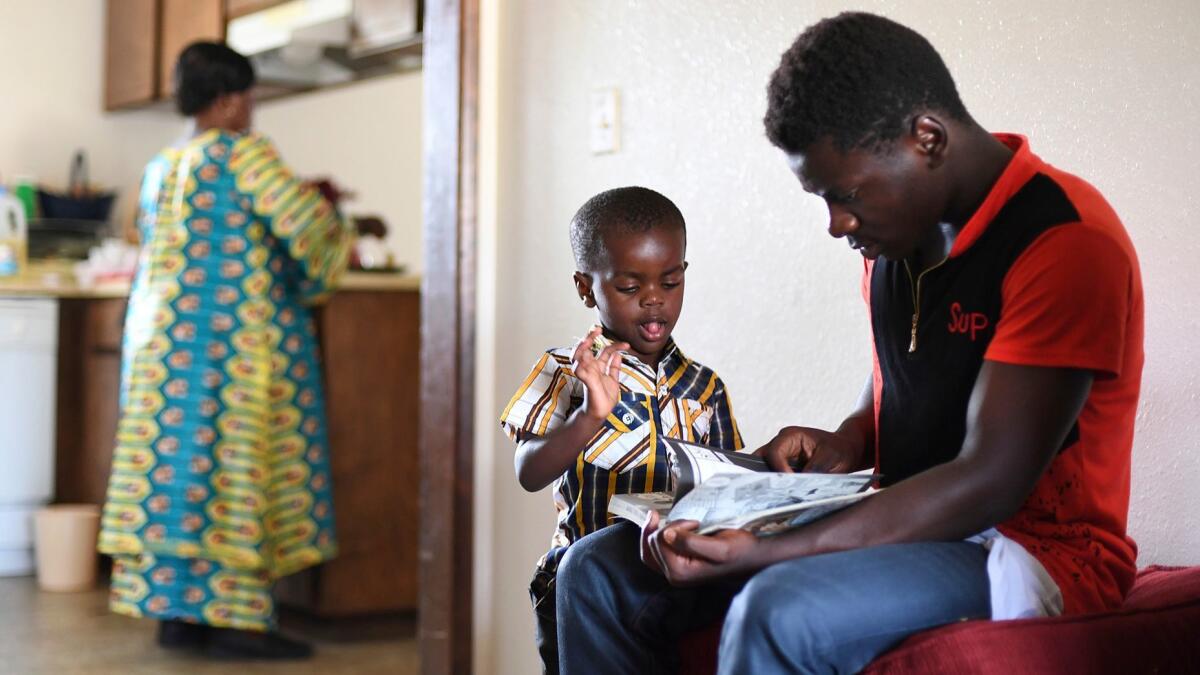Op-Ed: How America benefits from the refugees among us

The Trump administration’s refugee policies — a quota that cut annual admissions sharply, “extreme vetting” and a predilection for admitting only newcomers who can “assimilate easily” — ignore why the U.S. accepts displaced families in the first place. We do it because America contributes to the world’s destabilization, and because it is in our national interest to assure that those fleeing from “shithole countries” find a safe haven.
I first met brothers Solomon and Methusella at Denver’s South High School in October 2015, when they were 17 and 15 years old, respectively. They arrived from a refugee settlement in Uganda, but they were originally from the Democratic Republic of Congo, one of the most troubled nations in Africa. Congo (formerly Zaire) is the top sender of refugees to the United States. During the Second Congo War, also known as the African World War, nine countries became embroiled in conflict, and 5 million people died. The war officially ended in 2003, but dozens of armed groups are still fighting in Congo today.
When I visited Congo to understand what drove Solomon and Methusella’s family from their home, I met with their uncle, Nehemie, who still lives in the province of North Kivu, where the boys were born. Nehemie had remained behind because his elderly mother was not able to make the long trek to the refugee settlement. He described the kind of life the boys had endured before they escaped: rebels from militia groups stealing crops and abducting or killing villagers; a constant battle for survival.
We carry the ongoing Congo conflict with us every day, in the form of our smartphones and laptops.
“Every day, attack; every day, attack,” said Nehemie. “Maybe you are digging in the fields, and you hear guns and shouting, you hear the sounds of bullets…. It is like a daily process.”
Researchers have studied the effects of such violence on 1,046 teens in Ituri, a neighboring Congo province. Ninety-five percent had witnessed at least one traumatic event. The teens had lived through the loss of a family member or a friend due to a violent event (72%), witnessed someone being killed (66%), experienced the looting or the burning of their homes (62%), witnessed rape (33%), lost a parent (26%) or been kidnapped (19%). It is no surprise that many of these kids showed signs of post-traumatic stress syndrome.
The atrocities in Congo sound far-off and barbaric, and we want to believe that they have nothing to do with us. But we carry the ongoing Congo conflict with us every day, in the form of our smartphones and laptops. Approximately 30% of the world’s supply of the mineral coltan, essential for the miniaturization of electronic devices, comes from Congo, as does 60% of the world’s cobalt, used in lithium-ion batteries. Warlords frequently capture the mines and use the proceeds to fund their militias and their raids. According to news reports, children make up 40% of the mining workforce.
Solomon and Methusella escaped from the Congo’s chaos by walking with their parents and five siblings to Kyangwali Refugee Settlement. Families sheltering there practice subsistence farming, and Solomon’s mother and father soon asked him to stay home from the camp’s school to watch over his younger siblings so the adults could work in the fields. Enrollment in the primary schools inside Kyangwali drops significantly after third grade, as children take on responsibilities such as farming, hauling water, scavenging for fuel and taking care of their brothers and sisters. Only 16% of adolescents are enrolled in secondary education. Some families have lived in Kyangwali for multiple generations, stuck in a place where children are prepared only for a subsistence lifestyle, or a return to Congo’s chronic cycles of violence.
Once Solomon and Methusella’s family got the chance to resettle in Denver, the boys spent a year studying basic English, along with other subjects, at South High. I was a visitor in the English acquisition class, a journalist watching as nearly two dozen immigrants and refugees learned to adjust to America.
Methusella impressed me with the quality of his writing. He brought his notebook over to me to ask if I could correct his schoolwork — he had figured out that I was an underutilized resource at South High. In the classroom and on the soccer field, Solomon constantly exhibited unusual grace, stepping back to allow others to succeed too. In a “newcomer” science class, the brothers were often to be found in the first row of desks, fully engaged with the material and asking the teacher questions. They learned English so fast, they got to skip a year and a half of language instruction. Midway through their second year in Denver, the boys entered mainstream English classes (first major reading assignment: “To Kill a Mockingbird”). Both now serve in the Student Senate at South High.
Accepting refugees is clearly good for them, but it is also good for the United States. Stable nations are obliged by treaty and common decency to share the burden of refugee resettlement, but they also share in the benefits: Anyone who gets a chance to know individuals like Solomon and Methusella will discover what challenges the world poses, what strengths other cultures possess and to what degree people can transform.
The boys I got to know are a credit to their parents, South High and their adopted homeland. They will repay tenfold what they have received. Their extraordinary resilience is now an inspiring American asset.
Helen Thorpe is the author of “The Newcomers: Finding Refuge, Friendship, and Hope in an American Classroom” (Scribner, 2017).
Follow the Opinion section on Twitter @latimesopinionand Facebook
More to Read
A cure for the common opinion
Get thought-provoking perspectives with our weekly newsletter.
You may occasionally receive promotional content from the Los Angeles Times.










